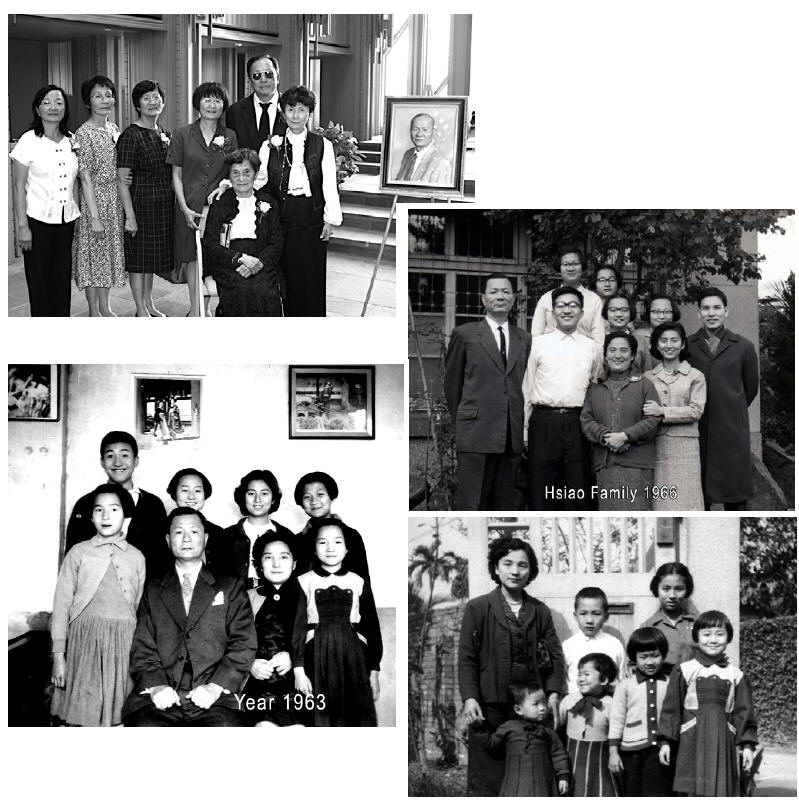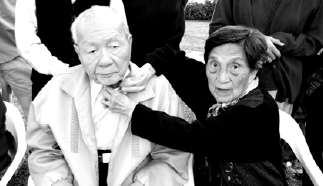|
|
The Life Of Yuh-Shya ,1921-2009 |
|
|
首頁/ English / Japanese Entries/ 本土信徒 / 史話 / 諸家論述 / 宣教師 / 外國神父修女 / 原住民 / 日人列傳 / 賴永祥著作/ 馬偕周邊 / PCT/ 劉家雜錄 |
||
|
|
Her father was a low-income railroad technician, and he had incurred a large debt paying for his ex-wife’s medical expenses. His new but large family made him even poorer. In their neighborhood, there was a couple who fought frequently. They were very fond of baby Yuhshya and wanted to adopt her. Believing that the couple’s marriage would improve if they had a child, her parents approved of Yuhshya’s adoption. Unfortunately, the baby could not save the marriage and the couple still got divorced. Yuhshya’s stepmother remarried a poor man, and Yuhshya rarely had good food as a child. In her elementary school years, she often only had water to drink while her classmates were eating lunch. However, she never complained. Although she had no money to go to a middle school, she diligently studied on her own and passed the entrance exam for nursing school. At that time, nursing school students could earn money by working at the hospitals while studying. On every payday, her step-father would come and take away all of her wages. In the meantime, the financial status of her birth family improved. However, she never told her birth parents of her hardships whenever she visited them because she did not want them to feel bad. (When she told her children about her childhood forty years later, she humorously said, ‘I thought God purposely made me as a modern-day Joseph.”) When she worked at Taiwan University Hospital, a Japanese worker took notice of her and made nice comments about her to an intern Hwachyuan. Unbeknownst to him, Hwachyuan had already been attracted by Yuhshya’s beauty and character. From that time on, he seized every opportunity to get close to her, even volunteering to be her English tutor. When Hwachyuan told his parents about Yuhshya, they strongly disapproved of the match because she was poor and a Christian. To avoid the conflict, Yuhshya departed to Japan for a while. Hwachyuan kept insisting that Yuhshya was the only girl for him to his parents. He eventually persuaded his father, and his father agreed to see her.
On that momentous day, Hwachyuan’s father took an eight-hour train from Kaohsiung to Taipei. When he took a connecting three-wheel carriage from the train station to the church where they had planned to meet, he noticed a young lady reading a book at a bus station. “What a diligent woman!” he thought. Later he learned that the woman he saw was Yuhshya herself. The more he got to know her, the more he liked her. Finally two lovers were married by a pastor at her birth parents’ house on Nov.17th, 1940. However, only Hwachyuan’s father, his brother, and a brother-in-law attended the wedding. Hwachyuan’s mother never showed any affection toward Yuhshya. The in-law relationship was further worsened by a certain relative’s gossip and slander. This relative irritated and persecuted the newlywed couple so much that Hwachyuan renounced his large inheritance and moved his family to Japan in 1942. This happened during the dangerous and hard years of WWII, but God took care of them and gave them two lovely children, Lily and Luke.
When Hwachyuan’s father became terminally ill, Yuhshya mailed money and letters about their family life to cheer him up every month. Although their income was limited, she faithfully took money from their savings, exchanged the old bills for new crisp ones from the bank, and mailed them out. Even after his death, she continued to do the same for Hwachyuan’s mom for seven or eight years. However, Hwachyuan’s mom never responded in any way. When Hwachyuan’s mom was dying, Yuhshya left her six children behind and went to Kaohsiung to take care of her for a few weeks. She did not understand why Hwachyuan’s mom often closed her eyes in tears. After she died, Hwachyuan’s sister ordered a custom-made paper house with a postman and postbox for the Buddhist funeral. When asked the reason for the postman, his sister said, “The happiest moments for Mom in her later years were receiving mail from you every month.” Yuhshya cried and said, “If only I had known that, I would have written to her more often.” After Hwachyuan’s mom’s death, the slandering relative finally confessed to the whole family, “Yuhshya is a nice person with excellent character. I did something very mean to her. If she wants me to kneel down to show my apology, I would do it.” This relative died several years later in middle age. With the financial aids and care from Hwachyuan and Yuhshya, some of his children were able to complete their college education and to become Christians. Yuhshya did a wonderful job in raising six kids and helping her husband. All the patients knew that she was exactly the right person to whom they could bring their problems and questions. (Her children did not like walking around the neighborhood with her because everyone wanted to talk to her and they could rarely get to their destination on time.) On the first day of each semester, she would cover the kids’ textbooks with used calendar paper and pray that God would help her kids to understand the contents of the books. When the children finished with their homework, she would sharpen their pencils, take their books to read aloud and asked them to correct her pronunciation. (She never learned Mandarin Chinese formally.) In that generation, parents rarely paid as much attention to the children’s education and discipline as the Hsiaos. They also made sure that they set good examples for the children. Yuhshya took all the kids to the church so that they could grow both spiritually and socially. She also opened up their home to the church youth, especially those from central and southern parts of Taiwan and were far from home. They all called her “Mama Hsiao,” and some of these people kept in touch with her after thirty or forty years. The hardships in her childhood made her very frugal her whole life. She creatively used everything that was broken or lost its primary function. A cracked tea pot would become a flower vase. A piece of paper from a magazine would be folded to a wastebasket tray. A worn bed sheet would be sewed into cover mats. On the other hand, she was always very generous to others, especially to churches and children’s schools. She was kind to all friends and relatives. She came to Los Angeles to apply for citizenship in 1973. She bought and ran a motel for the investment requirement from the immigration office. She had to use limited language skills to deal and fight with the new culture and society. She was lonely, frustrated, and tired, and often cried in dark. For the sake of her husband and three children who were still in Taiwan, she kept working until she got her green card. This experience allowed her to understand how to help many who were new to this country. She thrived at helping people finding positive meaning in negative circumstances. After settling down at Torrance, Yuhshya started new hobbies of sewing and knitting. She learned by asking her friends, by trial-and-error, and then she created her own style. Whenever her daughters came home, she eagerly anticipated their asking her to fix or mend things. After finishing a project, she would proudly said, “I am still a hero in demand.” All of her fifteen grandchildren have worn the clothes that she has made or fixed and own a sweater and blanket she knit. She also liked to repair things. When no help was elicited, she would ask her daughters to send their broken chair or cushions for her to fix. She also liked to take care of dying plants. Seeing things or people regain the beauty and purpose of life brought much joy to her.
Hwachyuan and Yuhshya always took care of their pastors. In Taiwan, they never charged the pastors’ families anything when they came over for treatment. Every Christmas and Chinese New Year, Yuhshya asked the children to send gifts to their pastors’ homes. They also never criticized pastors in the presence of children. They set a good example in respecting God’s servants. In Torrance, their home became a hostel for traveling pastors. When Torrance Taiwanese Presbyterian Church started in 1989, Hwachyuan and Yuhshya opened their house for the Sunday services and Thursday Bible studies. Four months later, the church started renting from St. Andrew’s Church for services. In 1995, the church desired to purchase land and build its own church. Hwachyuan became the first chairman of the fundraising committee and donated all his retirement pension. Yuhshya also worked hard with other ladies to plan more fundraising activities. She was already relatively old and fragile, but she did more than what she was required to do. The Hsiao’s adult children felt uncomfortable when their parents got involved in such a long-term and heavy task. Yuhshya and Hwachyuan did not seem to mind at all. The church building was completed in 2003, and everyone could finally relax. Yuhshya was very grateful that she was able to participate in building two churches in her first thirty years in the United States. Since 1982, she had been afflicted by asthma. Sometimes she was depressed, but did not want people to know. Even her daughters could hear her wheezing on the phone, she still said, “I am fine.” In 1989, she was sent to the Emergency Room by ambulance twice and was put on a ventilator. Fortunately, her first sonin-law, Daniel, was a pulmonary doctor. With his special skills and Hwachyuan’s tender loving care, she overcame the attack again and again. On Nov 17th, 1990, their family and friends celebrated their 50th golden anniversary at church. They dressed up as a groom and bride to enjoy the blessing and beautiful celebration that they were not able to have fifty years ago.
In May 2007, Charlene, Yuhshya's beloved daughter-in-law, died of cancer. Yuhshya was in sorrow for a year. Then Hwachyuan died of subdural hematoma in July 2008. She was hit hard again by losing her companion of 68 year. For keeping her in the surroundings that she was familiar and comfortable, her children and grandchildren all took turns to accompany and take care of her. Although she missed her husband very much, she gave thanks frequently for her loving offspring. Church members also showed their love by calling her and bringing her Taiwanese food often, and offered any kind of service whenever she needed. Abundant love supported her for another 6 months.
首頁Home/ 本土信徒總檔 / 教會史話總檔 / 宣教師人物總檔 / 外國神父修女列傳 / 日人列傳總檔 / 原住民信徒 / 諸家論述
|

 Yuhshya Guo was born at Taipei, Taiwan on Feb. 20th, 1921. Her father was a widower with four children and her mother was a widow with three children. Together they had another six children, and Yuhshya was the ninth of these thirteen.
Yuhshya Guo was born at Taipei, Taiwan on Feb. 20th, 1921. Her father was a widower with four children and her mother was a widow with three children. Together they had another six children, and Yuhshya was the ninth of these thirteen.
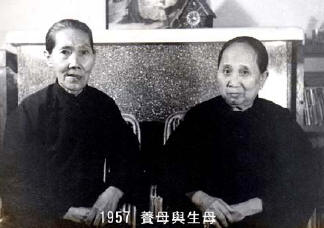
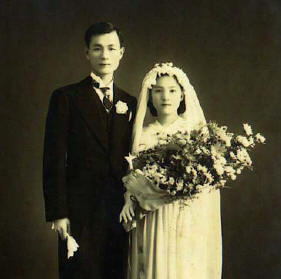 The family returned to Taiwan in 1946 after the war ended. They had to start life from scratch again, so they borrowed twenty thousand dollars from Yuhshya’s sister to rent a house and clinic space. While Hwachyuan was seeing patients, Yuhshya carried their third child on her back, mixed and
wrapped medicine, gave the patients shots, and watched over Lily and Luke simultaneously. Life was busy and difficult, but happy. Then God blessed the family with three more healthy children, Bernice, Martha and Peggy.
The family returned to Taiwan in 1946 after the war ended. They had to start life from scratch again, so they borrowed twenty thousand dollars from Yuhshya’s sister to rent a house and clinic space. While Hwachyuan was seeing patients, Yuhshya carried their third child on her back, mixed and
wrapped medicine, gave the patients shots, and watched over Lily and Luke simultaneously. Life was busy and difficult, but happy. Then God blessed the family with three more healthy children, Bernice, Martha and Peggy.
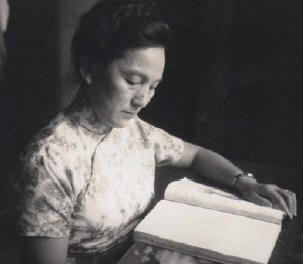
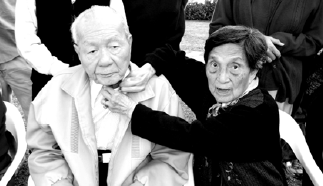 In the summer of 2000, Yuhshya kept losing weight and her health quickly deteriorated. She was hospitalized and thought she would not live to see her 60th wedding anniversary. By God's grace, however, she was healed. In the history of the Hsiaos, the Guos, and all their friends, no other couple had been able to pass their diamond anniversary. Therefore, Dr. and Mrs. Hsiao were frequently invited to weddings as a symbol of long and blessed marriage and as good luck for the young couples.
In the summer of 2000, Yuhshya kept losing weight and her health quickly deteriorated. She was hospitalized and thought she would not live to see her 60th wedding anniversary. By God's grace, however, she was healed. In the history of the Hsiaos, the Guos, and all their friends, no other couple had been able to pass their diamond anniversary. Therefore, Dr. and Mrs. Hsiao were frequently invited to weddings as a symbol of long and blessed marriage and as good luck for the young couples.
